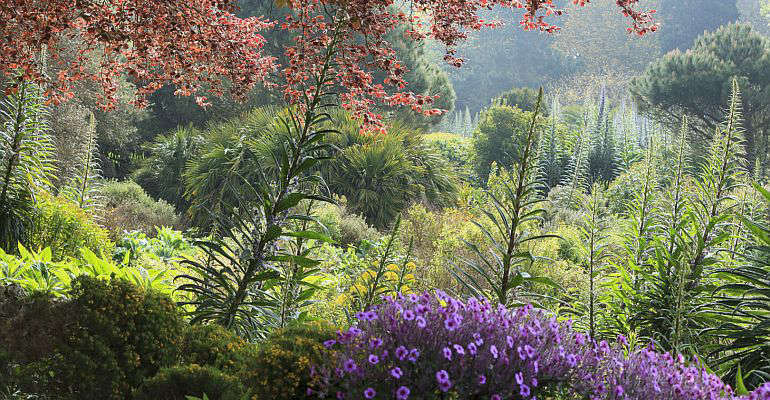
A stunning collection of Eucalyptus held at Ventnor Botanic Gardens, have now been secured for the future.
The nationally important collection of Eucalyptus trees has been accredited as a National Plant Collection by horticultural conservation charity Plant Heritage.
The collection is now protected for the future and will continue its vital role in helping mitigate against the challenges of climate change and encouraging wider biodiversity at both sites.
It will be celebrated throughout National Tree Week (23 November – 1 December).
Ventnor Botanic Garden’s newly accredited Eucalyptus collection is part of nationally important trial designed in the 1970s to test the limits of existing trees’ hardiness and introduce new species to the site.
The outcomes from this trial will increase current understanding about how climate change is affecting various trees and plants, and how gardens might respond in the future.
Consequently, most of Ventnor’s Eucalyptus trees are now regarded as county or national champions on the Tree Register, as a mark of their responsiveness to a warming climate and their significance as indicators of change.
Gwen Hines, CEO of Plant Heritage, said:
“Ventnor Botanic Gardens (is a) site of historical and national importance, (it) will be available for everyone to visit, in all seasons, in perpetuity.
"Also, the fact (it) will always have a dedicated team caring for these special trees is fundamental, as this will ensure (the) long-term survival.
"Knowing that the future is now secured is a real triumph for our ongoing plant conservation work.”
The UK is now home to over 700 National Plant Collections, from winter flowering Cyclamen and holly synonymous with Christmas, to early spring bulbs waiting to escape winter’s grasp.
These collections contain a staggering 95,000+ plants and together are crucial for encouraging biodiversity to thrive, as well as helping us adapt to and mitigate against the challenges of climate change.
These ‘living libraries’ are cared for by passionate individuals either at home, in the garden, greenhouse or nearby allotment, or by nurseries, garden centres, and larger organisations including arboretums, botanic gardens and historic houses.
Collections can be found in unexpected places too, such as a pub garden, a women’s prison, and zoos.
To start a National Plant Collection, find your nearest collection to visit, or for more information about how you can support Plant Heritage and the charity’s important conservation work, visit www.plantheritage.org.uk


 Get Down At Wessex Cancer Support's First Isle Of Wight Boogie Bingo
Get Down At Wessex Cancer Support's First Isle Of Wight Boogie Bingo
 Winners Announced For Monkton Arts Prize 2024
Winners Announced For Monkton Arts Prize 2024
 Charlton House Chuffed As Chinese New Year Celebrations Lift Spirits
Charlton House Chuffed As Chinese New Year Celebrations Lift Spirits
 Line-Up Announcement For Isle Of Isle Of Wight Story Festival
Line-Up Announcement For Isle Of Isle Of Wight Story Festival
 Island's Catholic Church Donates £3,000 To Mountbatten Hospice
Island's Catholic Church Donates £3,000 To Mountbatten Hospice



 Man Arrested On Suspicion Of Rape Following Meeting With Underage Girl
Man Arrested On Suspicion Of Rape Following Meeting With Underage Girl
 Hovertravel Boss To Step Down After 15 Years At The Helm
Hovertravel Boss To Step Down After 15 Years At The Helm
 Owners Of Seaside Town 'Eyesore' Fail To Carry Out Works Despite £8,000 Fine
Owners Of Seaside Town 'Eyesore' Fail To Carry Out Works Despite £8,000 Fine
 Celebrating 35 Years Of Walk The Wight: Registration Opens For 2025
Celebrating 35 Years Of Walk The Wight: Registration Opens For 2025
Comments
Add a comment